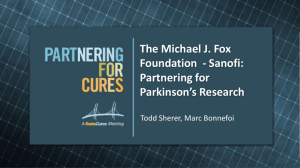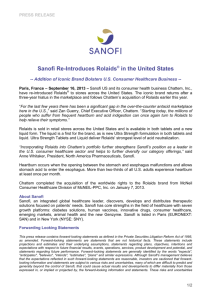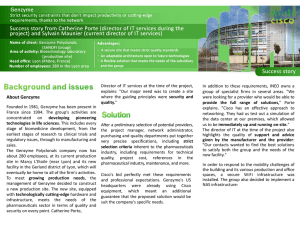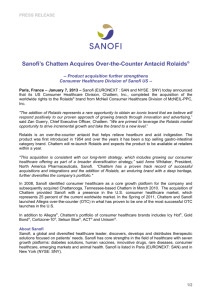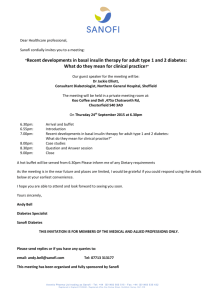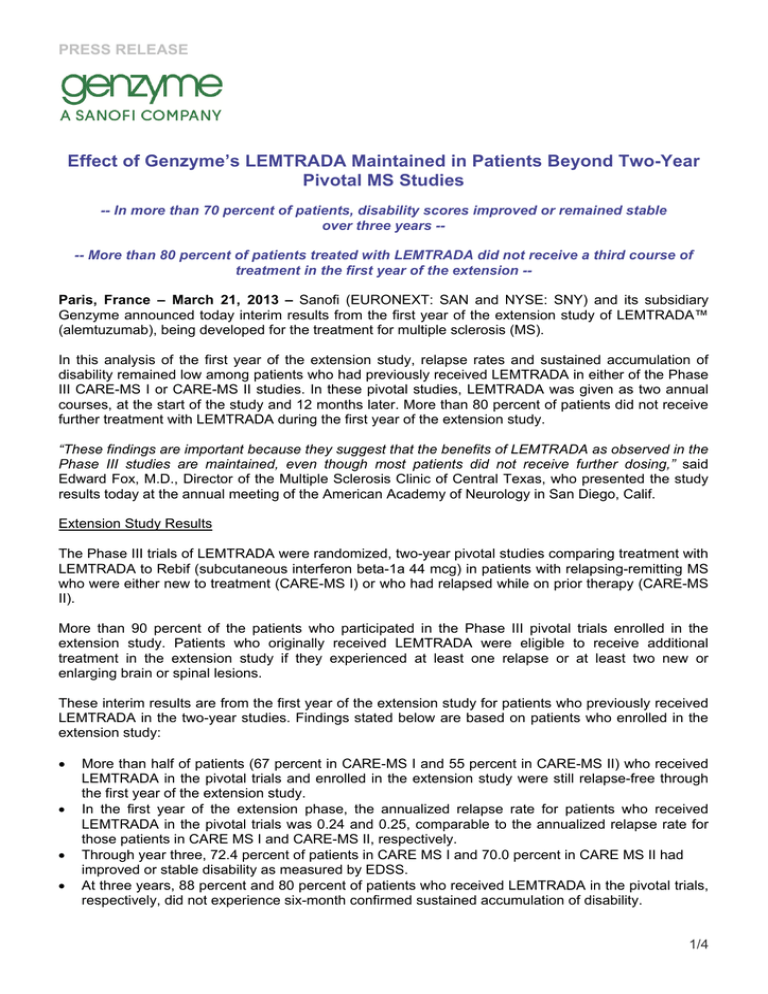
PRESS RELEASE
Effect of Genzyme’s LEMTRADA Maintained in Patients Beyond Two-Year
Pivotal MS Studies
-- In more than 70 percent of patients, disability scores improved or remained stable
over three years --- More than 80 percent of patients treated with LEMTRADA did not receive a third course of
treatment in the first year of the extension -Paris, France – March 21, 2013 – Sanofi (EURONEXT: SAN and NYSE: SNY) and its subsidiary
Genzyme announced today interim results from the first year of the extension study of LEMTRADA™
(alemtuzumab), being developed for the treatment for multiple sclerosis (MS).
In this analysis of the first year of the extension study, relapse rates and sustained accumulation of
disability remained low among patients who had previously received LEMTRADA in either of the Phase
III CARE-MS I or CARE-MS II studies. In these pivotal studies, LEMTRADA was given as two annual
courses, at the start of the study and 12 months later. More than 80 percent of patients did not receive
further treatment with LEMTRADA during the first year of the extension study.
“These findings are important because they suggest that the benefits of LEMTRADA as observed in the
Phase III studies are maintained, even though most patients did not receive further dosing,” said
Edward Fox, M.D., Director of the Multiple Sclerosis Clinic of Central Texas, who presented the study
results today at the annual meeting of the American Academy of Neurology in San Diego, Calif.
Extension Study Results
The Phase III trials of LEMTRADA were randomized, two-year pivotal studies comparing treatment with
LEMTRADA to Rebif (subcutaneous interferon beta-1a 44 mcg) in patients with relapsing-remitting MS
who were either new to treatment (CARE-MS I) or who had relapsed while on prior therapy (CARE-MS
II).
More than 90 percent of the patients who participated in the Phase III pivotal trials enrolled in the
extension study. Patients who originally received LEMTRADA were eligible to receive additional
treatment in the extension study if they experienced at least one relapse or at least two new or
enlarging brain or spinal lesions.
These interim results are from the first year of the extension study for patients who previously received
LEMTRADA in the two-year studies. Findings stated below are based on patients who enrolled in the
extension study:
More than half of patients (67 percent in CARE-MS I and 55 percent in CARE-MS II) who received
LEMTRADA in the pivotal trials and enrolled in the extension study were still relapse-free through
the first year of the extension study.
In the first year of the extension phase, the annualized relapse rate for patients who received
LEMTRADA in the pivotal trials was 0.24 and 0.25, comparable to the annualized relapse rate for
those patients in CARE MS I and CARE-MS II, respectively.
Through year three, 72.4 percent of patients in CARE MS I and 70.0 percent in CARE MS II had
improved or stable disability as measured by EDSS.
At three years, 88 percent and 80 percent of patients who received LEMTRADA in the pivotal trials,
respectively, did not experience six-month confirmed sustained accumulation of disability.
1/4
More than 80 percent of patients treated with LEMTRADA in the pivotal studies did not receive a
third course of treatment within a year of entering the extension study.
“These results underscore the tremendous promise that LEMTRADA holds for MS patients,” said David
Meeker, M.D., Genzyme’s President and Chief Executive Officer. “We’re pleased to be able to present
these three-year results that provide us with important new information about LEMTRADA and are
consistent with the published results from our Phase II extension study.”
Safety results from the first year of the extension study were reported for patients who received
LEMTRADA in the Phase III pivotal studies. No new risks were identified. The frequency and type of
common and serious adverse events in the first year of the extension study were generally similar to
those in the Phase III pivotal studies. The most common adverse events during this period of time were
infections, including predominantly mild to moderate upper respiratory and urinary tract infections.
There were two deaths. One, as previously reported, was from sepsis. The other was presumed
accidental and deemed unrelated to study treatment. The cumulative incidence of autoimmune thyroid
disease over three years was 29.9 percent, as expected based on the Phase II study experience.
Additionally, over three years, approximately 1 percent of patients developed immune
thrombocytopenia (ITP) and 0.3 percent developed nephropathy, all of whom responded to treatment.
These cases were detected early through routine monitoring. Patient monitoring for autoimmune
disorders is incorporated in all Genzyme-sponsored trials of LEMTRADA.
Genzyme’s applications to market LEMTRADA for the treatment of MS are currently being reviewed by
the European Medicines Agency and the U.S. Food and Drug Administration. The company expects
action on both applications this year.
About CARE-MS
The CARE-MS trials are Phase III, global, randomized clinical trials designed to evaluate whether the
investigational MS therapy LEMTRADA could achieve meaningful efficacy and safety improvements
over the approved, active comparator Rebif (subcutaneous interferon beta-1a 44 mcg), a standard
treatment for relapsing-remitting MS. The CARE-MS I study evaluated 581 patients naïve to prior MS
treatment, except for steroids. The CARE-MS II study evaluated 840 patients who have had at least
one relapse occurring while on MS therapy, including standard injectable disease modifying therapies.
Genzyme announced publication of results of these studies in The Lancet in November 2012.
In the both trials, LEMTRADA was given as an IV administration a total of eight times over the course
of the two-year study. The first treatment course of LEMTRADA was administered on five consecutive
days, and the second course was administered on three consecutive days 12 months later. Rebif 44
mcg was administered by subcutaneous injection three times per week, each week, throughout the two
years of study. In the third-year following initial treatment, starting the extension phase of the trials,
patients who experienced resumed disease activity were retreated with LEMTRADA once daily for
three days. Patients who took Rebif in the pivotal study phase and crossed over to receive LEMTRADA
in the extension phase received LEMTRADA once daily for five days and then once daily for three days
one year later.
About LEMTRADA™ (alemtuzumab)
Alemtuzumab is a monoclonal antibody that selectively targets CD52, a protein abundant on T and B
cells. Treatment with alemtuzumab results in the depletion of circulating T and B cells thought to be
responsible for the damaging inflammatory process in MS. Alemtuzumab has minimal impact on other
immune cells. The acute anti-inflammatory effect of alemtuzumab is immediately followed by the onset
of a distinctive pattern of T and B cell repopulation that continues over time, rebalancing the immune
system in a way that potentially reduces MS disease activity.
Genzyme holds the worldwide rights to alemtuzumab and has primary responsibility for its development
and commercialization in multiple sclerosis. Bayer HealthCare retains an option to co-promote
2/4
alemtuzumab in multiple sclerosis. Bayer HealthCare has notified Genzyme of its intention to copromote under this option. Upon regulatory approval and commercialization, Bayer would receive
contingent payments based on sales revenue.
LEMTRADATM is the proprietary name submitted to health authorities for the company’s investigational
multiple sclerosis agent alemtuzumab.
About Genzyme, a Sanofi Company
Genzyme has pioneered the development and delivery of transformative therapies for patients affected
by rare and debilitating diseases for over 30 years. We accomplish our goals through world-class
research and with the compassion and commitment of our employees. With a focus on rare diseases
and multiple sclerosis, we are dedicated to making a positive impact on the lives of the patients and
families we serve. That goal guides and inspires us every day. Genzyme’s portfolio of transformative
therapies, which are marketed in countries around the world, represents groundbreaking and life-saving
advances in medicine. As a Sanofi company, Genzyme benefits from the reach and resources of one of
the world’s largest pharmaceutical companies, with a shared commitment to improving the lives of
patients. Learn more at www.genzyme.com.
About Sanofi
Sanofi, a global and diversified healthcare leader, discovers, develops and distributes therapeutic
solutions focused on patients’ needs. Sanofi has core strengths in the field of healthcare with seven
growth platforms: diabetes solutions, human vaccines, innovative drugs, consumer healthcare,
emerging markets, animal health and the new Genzyme. Sanofi is listed in Paris (EURONEXT: SAN)
and in New York (NYSE: SNY).
Genzyme® is the registered trademark of Genzyme Corporation. All rights reserved.
Rebif® is a registered trademark of EMD Serono, Inc. or affiliates.
About Bayer HealthCare
The Bayer Group is a global enterprise with core competencies in the fields of health care, nutrition and
high-tech materials. Bayer HealthCare, a subgroup of Bayer AG with annual sales of EUR 17.2 billion
(2011), is one of the world’s leading, innovative companies in the healthcare and medical products
industry and is based in Leverkusen, Germany. The company combines the global activities of the
Animal Health, Consumer Care, Medical Care and Pharmaceuticals divisions. Bayer HealthCare’s aim
is to discover, develop, manufacture and market products that will improve human and animal health
worldwide. Bayer HealthCare has a global workforce of 55,700 employees (Dec 31, 2011) and is
represented in more than 100 countries. Find more information at www.bayerhealthcare.com.
Sanofi Forward Looking Statements
This press release contains forward-looking statements as defined in the Private Securities Litigation Reform Act
of 1995, as amended. Forward-looking statements are statements that are not historical facts. These statements
include projections and estimates and their underlying assumptions, statements regarding plans, objectives,
intentions and expectations with respect to future financial results, events, operations, services, product
development and potential, and statements regarding future performance. Forward-looking statements are
generally identified by the words “expects”, “anticipates”, “believes”, “intends”, “estimates”, “plans” and similar
expressions. Although Sanofi’s management believes that the expectations reflected in such forward-looking
statements are reasonable, investors are cautioned that forward-looking information and statements are subject
to various risks and uncertainties, many of which are difficult to predict and generally beyond the control of Sanofi,
that could cause actual results and developments to differ materially from those expressed in, or implied or
projected by, the forward-looking information and statements. These risks and uncertainties include among other
things, the uncertainties inherent in research and development, future clinical data and analysis, including post
marketing, decisions by regulatory authorities, such as the FDA or the EMA, regarding whether and when to
approve any drug, device or biological application that may be filed for any such product candidates as well as
their decisions regarding labelling and other matters that could affect the availability or commercial potential of
3/4
such product candidates, the absence of guarantee that the product candidates if approved will be commercially
successful, the future approval and commercial success of therapeutic alternatives, the Group’s ability to benefit
from external growth opportunities, trends in exchange rates and prevailing interest rates, the impact of cost
containment policies and subsequent changes thereto, the average number of shares outstanding as well as
those discussed or identified in the public filings with the SEC and the AMF made by Sanofi, including those listed
under “Risk Factors” and “Cautionary Statement Regarding Forward-Looking Statements” in Sanofi’s annual
report on Form 20-F for the year ended December 31, 2012. Other than as required by applicable law, Sanofi
does not undertake any obligation to update or revise any forward-looking information or statements.
Contacts:
Sanofi Media Relations
Marisol Péron
Tel: +33 (0) 1 53 77 46 46
E-mail: mr@sanofi.com
Sanofi Investor Relations
Sébastien Martel
Tel: +33 (0) 1 53 77 45 45
E-mail: ir@sanofi.com
Genzyme Media Relations
Erin Walsh
Tel: 617-768-6881
E-mail: Erin.Walsh@genzyme.com
Sanofi Investor Relations
Kristen Galfetti
Tel: +1 908 981 5560
E-mail: ir@sanofi.com
4/4

